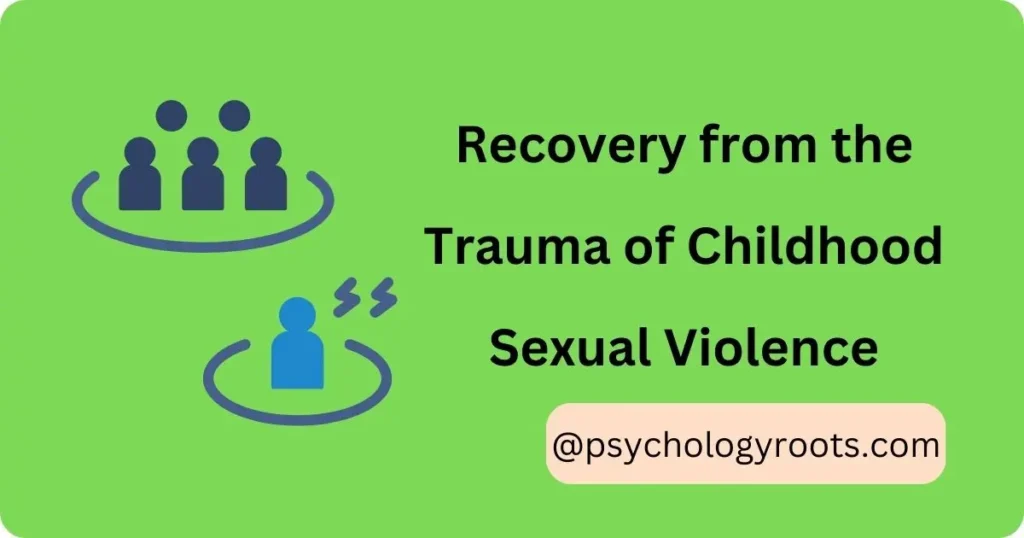Table of Contents
Recovery from the Trauma of Childhood Sexual Violence
Here in this post, we are discussing “Recovery from the Trauma of Childhood Sexual Violence”. You can read more about psychology-related material on our website. Keep visiting Psychology Roots.
Table of Contents
The process of healing from the profound wounds inflicted by childhood sexual violence is a formidable journey, yet it is imperative to underscore that restoration is indeed achievable. Survivors of these distressing experiences can find solace and regain agency over their lives through a multitude of avenues encompassing support networks, resilience, and personal growth. This article endeavors to explore the potentiality for healing from the trauma of childhood sexual violence, shedding light on the empowering odysseys survivors may undertake.

Recognizing the Impact:
The initial stride towards healing involves acknowledging the profound impact of childhood sexual violence. It is of paramount importance to break the barriers of silence and validate the pain endured as a consequence of these acts of abuse. By validating survivors’ experiences and comprehending the enduring effects of trauma, society can establish a supportive milieu conducive to the healing process.
Accessing Support:
Survivors of childhood sexual violence frequently benefit from seeking professional assistance and engaging in support networks. Skilled therapists and counselors specialized in trauma offer invaluable guidance, equipping survivors with coping mechanisms to navigate emotional distress and negotiate the intricate complexities of their trauma. The participation in peer support groups fosters a sense of community and shared understanding, thereby mitigating feelings of isolation.
Empowerment through Education:
Education emerges as a pivotal tool in empowering survivors to heal from the trauma of childhood sexual violence. By acquiring a comprehensive understanding of the dynamics of abuse and its broader societal context, survivors can reclaim their agency and foster self-empowerment. Educational initiatives and awareness campaigns serve as catalysts for transformative change, challenging prevalent cultural norms and promoting empathy and understanding.
Self-Care and Self-Compassion:
Incorporating self-care practices assumes a pivotal role in the healing journey of survivors. Nurturing physical and emotional well-being through activities such as exercise, meditation, and creative outlets facilitates the recovery process. Equally significant is the cultivation of self-compassion, which enables survivors to treat themselves with kindness and understanding, countering the negative self-perceptions that often arise from their traumatic experiences.
Rebuilding Trust and Relationships:
Childhood sexual violence disrupts trust in oneself and others. Rebuilding trust necessitates a gradual process encompassing the establishment of boundaries, cultivation of healthy relationships, and pursuit of genuine connections. Engaging in therapy assists survivors in navigating trust-related challenges and establishing fulfilling bonds with others.
Advocacy and Empowerment:
Many survivors find empowerment through advocating for themselves and others. By sharing their narratives, survivors challenge the stigmatization surrounding childhood sexual violence and actively contribute to societal transformation. Empowered survivors play an integral role in heightening awareness, promoting legislative measures, and supporting initiatives aimed at safeguarding children from sexual violence.
Conclusion:
While the journey towards healing from childhood sexual violence may be arduous, it is crucial to underscore that survivors can transcend their trauma and rebuild their lives. By acknowledging the impact, accessing support networks, empowering themselves through education, practicing self-care and self-compassion, rebuilding trust, and assuming an advocacy role, survivors can find solace, regain agency, and inspire transformative change. By fostering a supportive and empathetic environment, society assumes a pivotal role in facilitating the healing process and ensuring a brighter future for survivors of childhood sexual violence.
Help Us Improve This Article
Have you discovered an inaccuracy? We put out great effort to give accurate and scientifically trustworthy information to our readers. Please notify us if you discover any typographical or grammatical errors.
Make a comment. We acknowledge and appreciate your efforts.
If you have any scale or any material related to psychology kindly share it with us at psychologyroots@gmail.com. We help others on behalf of you.